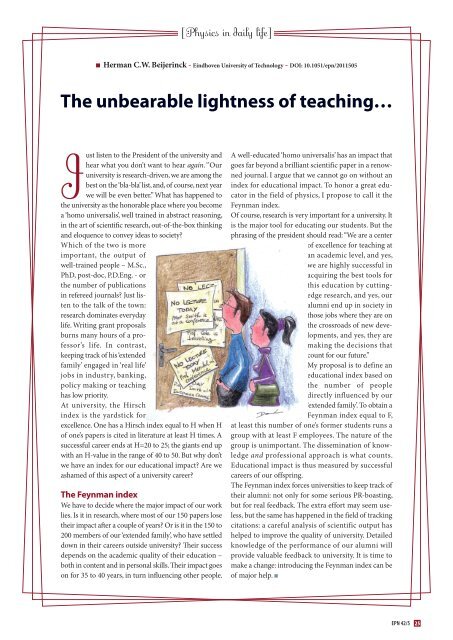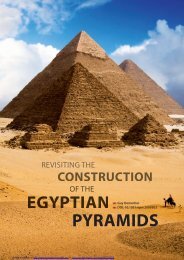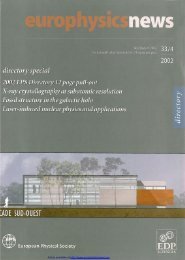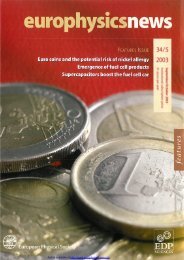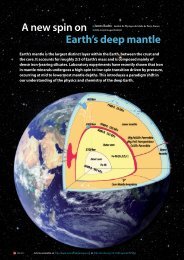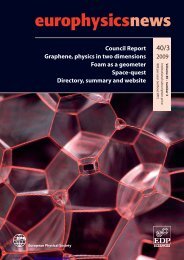PDF (11.37 MB) - Europhysics News
PDF (11.37 MB) - Europhysics News
PDF (11.37 MB) - Europhysics News
Create successful ePaper yourself
Turn your PDF publications into a flip-book with our unique Google optimized e-Paper software.
Just listen to the President of the university and<br />
hear what you don’t want to hear again.‘’Our<br />
university is research-driven, we are among the<br />
best on the‘bla-bla’list, and, of course, next year<br />
we will be even better.’’ What has happened to<br />
the university as the honorable place where you become<br />
a ‘homo universalis’, well trained in abstract reasoning,<br />
in the art of scientific research, out-of-the-box thinking<br />
and eloquence to convey ideas to society?<br />
Which of the two is more<br />
important, the output of<br />
well-trained people – M.Sc.,<br />
PhD, post-doc, P.D.Eng. - or<br />
the number of publications<br />
in refereed journals? Just listen<br />
to the talk of the town:<br />
research dominates everyday<br />
life. Writing grant proposals<br />
burns many hours of a professor’s<br />
life. In contrast,<br />
keeping track of his‘extended<br />
family’ engaged in ‘real life’<br />
jobs in industry, banking,<br />
policy making or teaching<br />
has low priority.<br />
At university, the Hirsch<br />
index is the yardstick for<br />
excellence. One has a Hirsch index equal to H when H<br />
of one’s papers is cited in literature at least H times. A<br />
successful career ends at H=20 to 25; the giants end up<br />
with an H-value in the range of 40 to 50. But why don’t<br />
we have an index for our educational impact? Are we<br />
ashamed of this aspect of a university career?<br />
The Feynman index<br />
We have to decide where the major impact of our work<br />
lies. Is it in research, where most of our 150 papers lose<br />
their impact a�er a couple of years? Or is it in the 150 to<br />
200 members of our ‘extended family’, who have settled<br />
down in their careers outside university? �eir success<br />
depends on the academic quality of their education –<br />
both in content and in personal skills. �eir impact goes<br />
on for 35 to 40 years, in turn influencing other people.<br />
[Physics in daily life]<br />
■ Herman C.W. Beijerinck - Eindhoven University of Technology - DOI: 10.1051/epn/2011505<br />
The unbearable lightness of teaching…<br />
A well-educated ‘homo universalis’ has an impact that<br />
goes far beyond a brilliant scientific paper in a renowned<br />
journal. I argue that we cannot go on without an<br />
index for educational impact. To honor a great educator<br />
in the field of physics, I propose to call it the<br />
Feynman index.<br />
Of course, research is very important for a university. It<br />
is the major tool for educating our students. But the<br />
phrasing of the president should read: “We are a center<br />
of excellence for teaching at<br />
an academic level, and yes,<br />
we are highly successful in<br />
acquiring the best tools for<br />
this education by cuttingedge<br />
research, and yes, our<br />
alumni end up in society in<br />
those jobs where they are on<br />
the crossroads of new developments,<br />
and yes, they are<br />
making the decisions that<br />
count for our future.’’<br />
My proposal is to define an<br />
educational index based on<br />
the number of people<br />
directly influenced by our<br />
‘extended family’. To obtain a<br />
Feynman index equal to F,<br />
at least this number of one’s former students runs a<br />
group with at least F employees. The nature of the<br />
group is unimportant. The dissemination of knowledge<br />
and professional approach is what counts.<br />
Educational impact is thus measured by successful<br />
careers of our offspring.<br />
The Feynman index forces universities to keep track of<br />
their alumni: not only for some serious PR-boasting,<br />
but for real feedback. The extra effort may seem useless,<br />
but the same has happened in the field of tracking<br />
citations: a careful analysis of scientific output has<br />
helped to improve the quality of university. Detailed<br />
knowledge of the performance of our alumni will<br />
provide valuable feedback to university. It is time to<br />
make a change: introducing the Feynman index can be<br />
of major help. ■<br />
EPN 42/5 25


